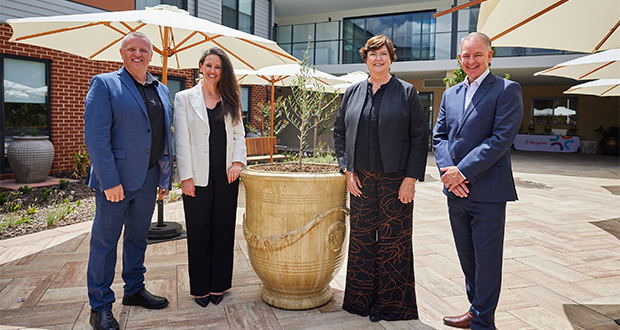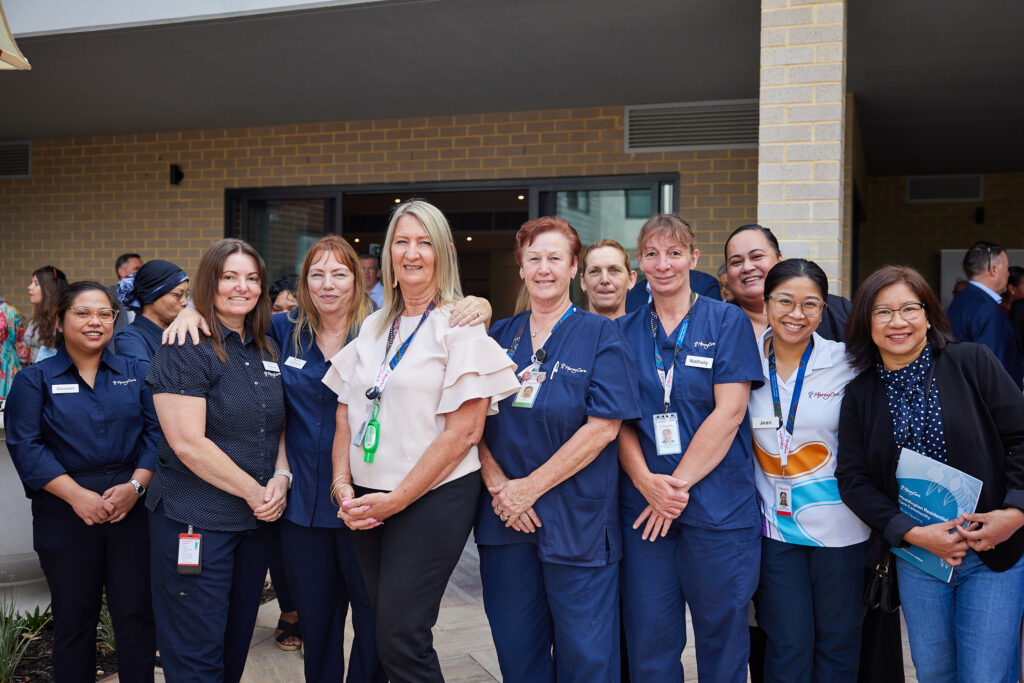A new residential aged care opened in southern Western Australia, basing its practices and homes on community.
MercyCare has opened a new facility in Maddington, south-east of Perth, which has six houses each housing 18 residents.
The 108-bed community is a reflection of MercyCare's vision.
"Our brief from the very beginning was that we wanted to create a place that would be home to 108 residents but was one that felt intimate and domestic," said the chief of MercyCare Anthony Smith.
Each home will support 18 residents with high care needs, including two secure wings for 36 ambulant residents with advanced dementia.
The houses have their own lounge room, small library and quiet area, and dining room – all of domestic scale and intimacy.
Bedrooms were designed to feel comfortable and homely, whilst supporting the provision of high-quality clinical and personal care.
However, Mr Martin said one of his favourite parts of the home was the enabling kitchens.
"We cook all of our food on-site for our residents, but know that experience of cooking, and participating in meal preparation, is important to many of them.
"The dining room has easy access to internal gardens via automatic doors and includes an enabling kitchen which can be used by staff or families and residents to cook simple items like pancakes or scones engaging residents in everyday activities just like they would if they were in their own home."
Each of the small homes had different zones to suit residents' needs at different points in the day.
"This includes quiet, alternative living spaces in each wing as well as larger communal activity and wellness areas, including beautiful, landscaped gardens with fruit tree and vegetable gardens as well as a self-service café, hair salon and a wellness hub," Mr Martin said.
The $35m facility offers allied health and therapy services and the newest technology to enhance residents' care and independence.
Executive director of aged care services at MercyCare Phil Martin said technology was a key feature in ensuring the home was "future proof".
"There is a lot of amazing technology built into the home to deliver our innovative approach," Mr Martin said.
"We want our residents to feel as independent as possible, so we have technology in rooms that passively monitor resident movements – so we can detect if they may have had a fall, or are at risk of a fall, or if someone else has wandered into their room when they shouldn’t have, all whilst respecting their privacy."
"We want the people who live here to truly experience our person-centred philosophy of ‘if it matters to you, it matters to us’, and this building has been cleverly and uniquely designed to support our delivery of this vision."
A new model of care was also recently adopted at MercyCare where it introduced the role of a care companion.
Instead of having different people for different roles in delivering care, a care companion would look after the residents' holistic needs.
"Our Care Companions are then focused on what is truly important to a resident and assist them with that on their day," Mr Martin said
"It means we are truly listening and delivering what each of our residents want – which is the true definition of person-centred care."
Dementia design principles, such as contrasting colours and materials, have also been adopted across the Maddington facility.
The Aged Care Royal Commission recommended that aged care focus more on the "experience of living in the home".
A draft National Aged Care Design and Principles were written in September last year.
Nicolas Seeman, a member of the committee that drafted the recommendations, spoke to Aged Care Insite about the decisions which included four principles to lower the amount of information residents have to process.
"The whole reason why we did the four principles was we wanted them to be simple, memorable ideas," Mr Seeman said.
"Once you look for it, they're obvious, but if we're not in that mindset, people traditionally will preference what they think is good style as opposed to a functional environment.
"When we're looking at design in aged care, it's not about chandeliers or fancy appearances, it's really about some quite pragmatic things."
The approach in the design phase also saw the MercyCare team develop ‘Day in the Life’ studies for key roles and equipment, ensuring back-of-house operations were as discrete as possible – adding to the homely feel.
"We conducted studies in the day of the life of laundry staff, kitchen staff and care staff as well as day in the life studies of equipment like linen trolleys – so we could understand in detail how a person or item moves through a home, where they or it needs to be at certain times, making sure that journey was not only as efficient as possible – but also minimised any impact to the residents,” Mr Martin said.
The new home will officially welcome its first residents in March.
Do you have an idea for a story?Email [email protected]
 Aged Care Insite Australia's number one aged care news source
Aged Care Insite Australia's number one aged care news source


